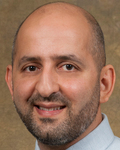The AAPP Foundation is thrilled to be supporting two sessions at the 2023 AAPP Annual Meeting, to be presented live in Atlanta, Georgia and livestreamed for virtual attendees. These sessions align with the Foundation’s mission to advance the psychiatric pharmacy profession by supporting research, scholarship, and practitioner development.
 Moderated by: Kelly Gable, PharmD, BCPP (Moderator), Professor and Director of Well-being and Resilience, SIUE School of Pharmacy, Edwardsville, IL
Moderated by: Kelly Gable, PharmD, BCPP (Moderator), Professor and Director of Well-being and Resilience, SIUE School of Pharmacy, Edwardsville, IL
Session Summary
In this session, four individuals will share lived experiences with mental illness, including their journey to find a suitable treatment plan, as well as experienced stigma and life or career challenges. Moderator Kelly Gable, PharmD, BCPP, will guide participants through an empathy-building exercise, help participants reflect on current perceptions of peers living with mental illness, and provide evidence to ultimately improve patient interactions and care.
Display
The AAPP Foundation is proud to be sponsoring the Stories Among Us display in Atlanta, showcasing stories of mental illness among AAPP peers. We encourage attendees to take some time to read the stories and to share their own if they feel so inclined.
 Presented by: Arash Javanbakht, MD, Director, Stress, Trauma, and Anxiety Research Clinic (STARC), Detroit, MI
Presented by: Arash Javanbakht, MD, Director, Stress, Trauma, and Anxiety Research Clinic (STARC), Detroit, MI
Session Summary
As threats such as war, persecution, and natural disasters around the world continue, it is estimated that 1 in 100 individuals will become a refugee in the near future. Psychiatric pharmacists can play an important role supporting individual members of the refugee population who experience depression, anxiety, and post-traumatic stress disorder, which occur at higher rates than the general population. However, pharmacists must be trained to support the mental health of this population and reduce barriers to accessing care. Cultural differences not only impact the willingness of members of a refugee population to seek treatment, but if treatment is sought, these individuals often face racism, bias, and discrimination from health care providers. In the session, participants will explore factors impacting mental health and identify cultural considerations when working with the refugee population to establish culturally sensitive care.